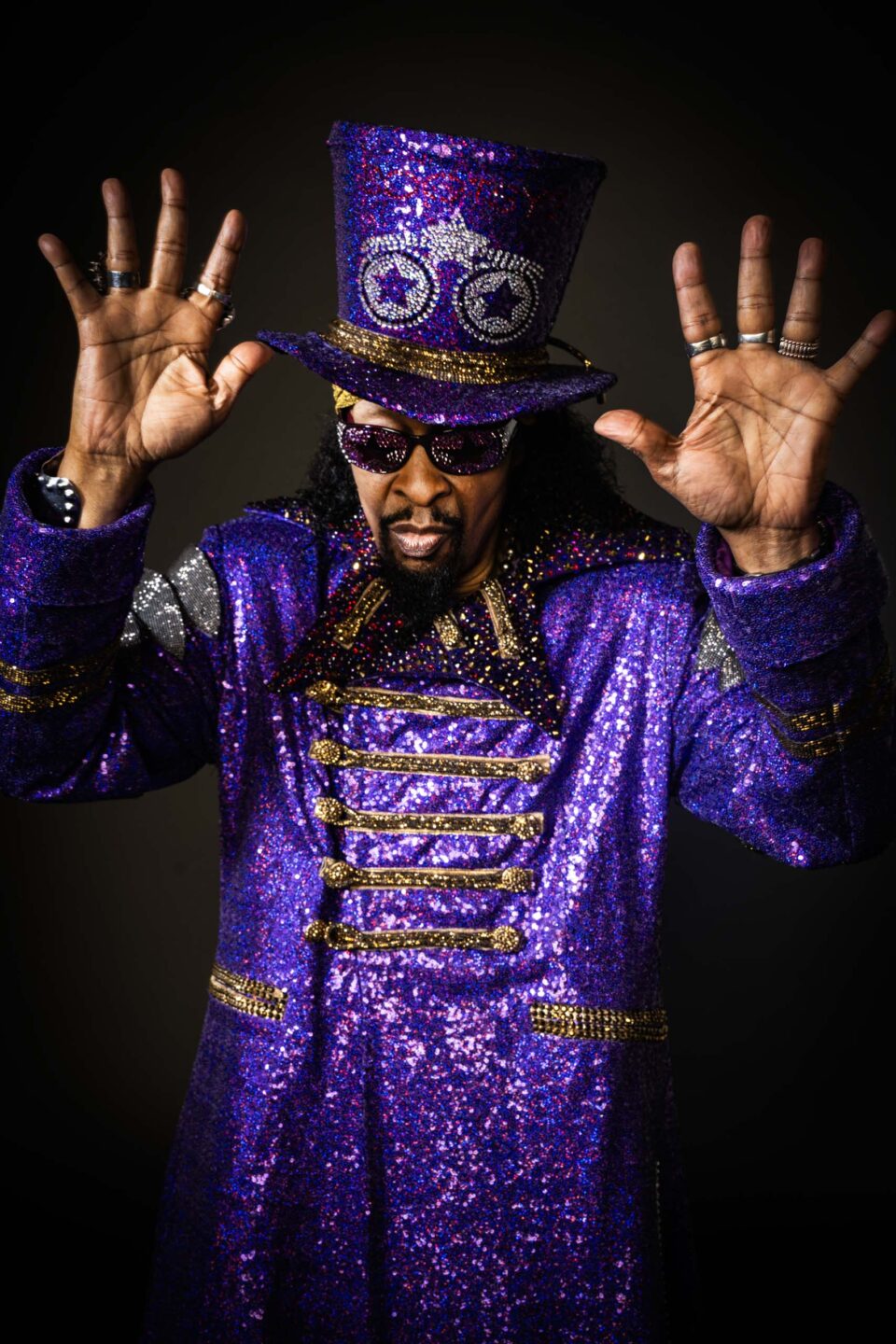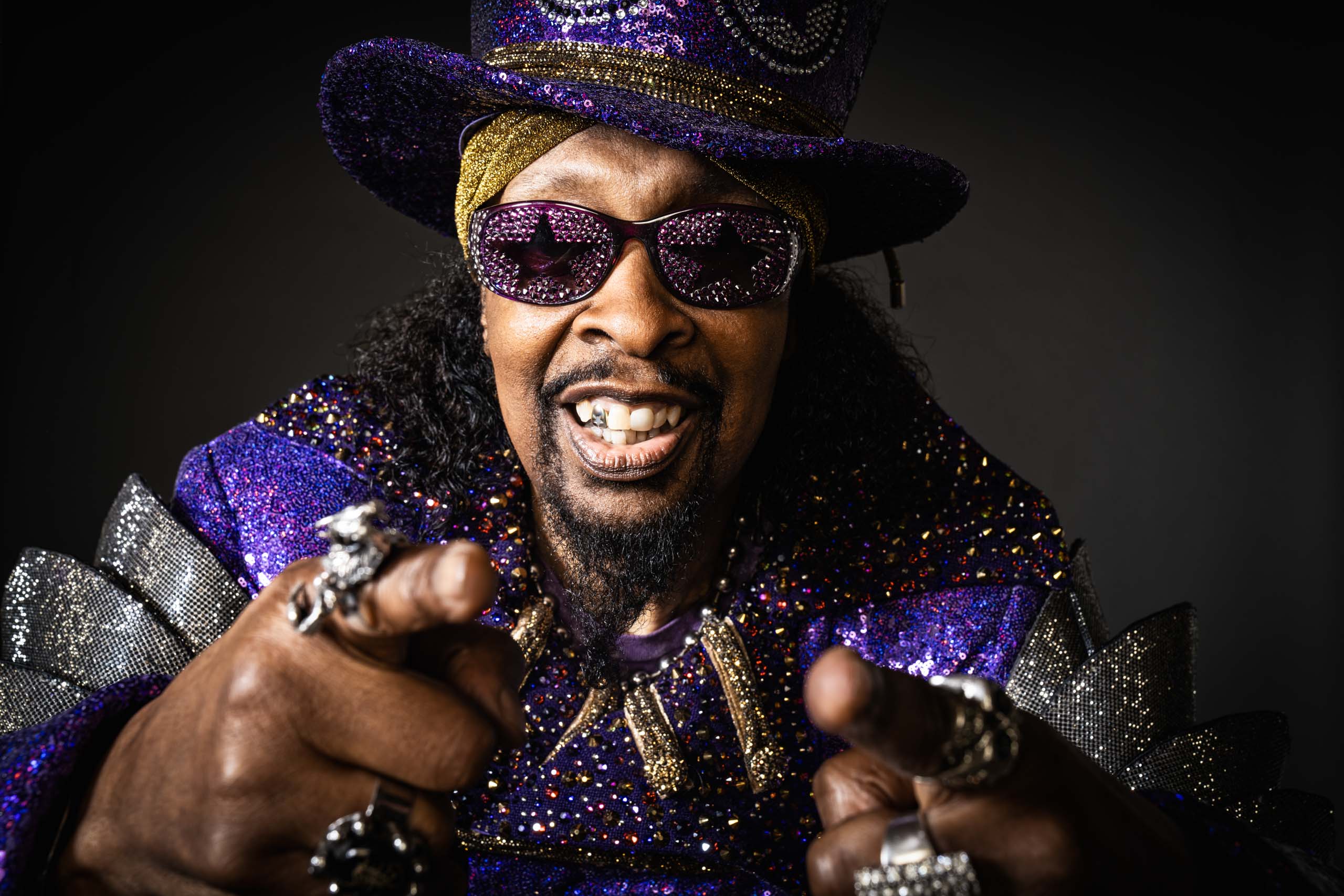Bootsy Collins remains strong. The Cincinnati-born musician earned his stripes in the 1970s by performing with James Brown, recording with Parliament and Funkadelic, and launching a successful career as both a solo act and as the frontman of Bootsy’s Rubber Band. In April of this year, he released Album of the Year #1 Funkateer, a funk-drenched collection of 18 tracks that harkens back to his glorious past and shows his staying power, assisted by collaborations with Snoop Dogg, Ice Cube, and Musiq Soulchild, among others.
During his recent press run in Southern California, Bootsy engaged in a string of high-profile events that highlighted his status as a musical icon and garnered anticipation for his new album, such as a conversation with Ice Cube at the GRAMMY Museum in LA. In our own Q&A, Bootsy discusses both the classic and forward-thinking stylings of Album of the Year #1 Funkateer, serving as a mentor to younger artists, and what music—and society more broadly—lost as it moved from groups to solo acts. Watch the full chat or read the edited transcript of the conversation below.
“#1 Funkateer” is the title of a song on your 1982 album The One Giveth, The Count Taketh Away. Why did you bring that title back for the new album?
I named the group of people that were following the funk “Funkateers.” We had “Rubber Fans,” because we had Bootsy’s Rubber Band. So it was Rubber Fans and Funkateers. Actually, we’ve been using “Funkateers” ever since then, so I just wanted to make it an update with the album for people who didn’t know about it. New Funkateers.
On the title track, you also use a bass line fans might recognize from the title track from your 1977 LP Ahh…The Name Is Bootsy, Baby! Why did you decide to incorporate some of your classic material into your new album?
I did that because I knew that the old Funkateers would relate to it and I didn’t want to get too new on ’em and make them feel like I was leaving them behind. For me, it was more like the new people that didn’t know about Funkateers, I had to say it so they understand that, “OK, I’m a funkateer now.” It’s kind of like merging both the young and the older Funkateers together without saying what you’re doing. I feel it’s important that people know that we can work together and we don’t have to dog each other. The whole album is based on that: bringing people together and letting people know that no one person is the one. It’s always all the people making up the one. I’m not the one. He, she is not the one. We all are. I put it like this: If you want to play, why would I want to play with you if you didn’t want to play, too?
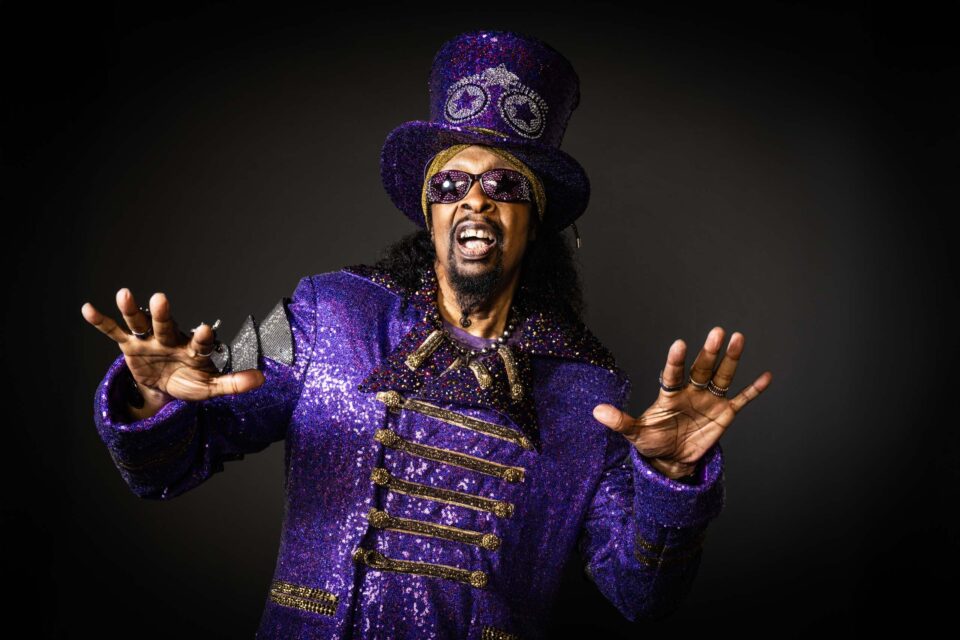
“The whole album is based on that: bringing people together and letting people know that no one person is the one.”
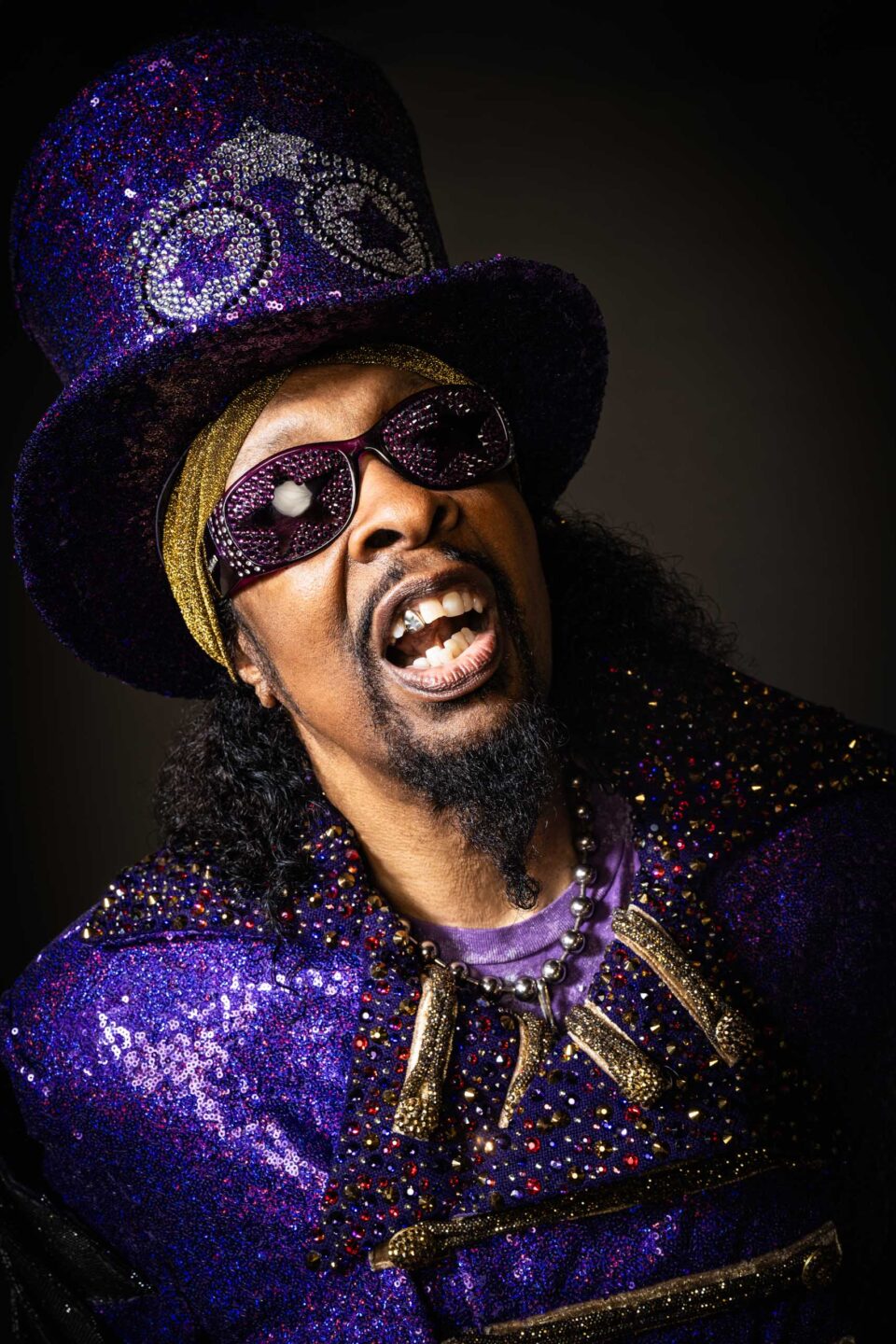
It’s got to be a two-way street.
It’s got to be. I think people need to realize that, because we’ve been programmed to just want it for ourselves—which has been a cool concept. But the way things are going now, AI and all this different stuff is coming in. We’re already battling each other. Now we’re going to have a real battle. So we should know that we can do all things together. All things. To me, that’s why this album is very important—not just musically, but consciously, just to let people know that you can be different. And a lot of us are different, and it’s OK. I just want people to embrace the OK part, because the rejection thing, we’ve had enough of that shit.
People are looking to you in the mentor role versus when you were with James Brown, for example, early in your career. What did you learn then that you apply to what you’re doing today?
Well, you don’t tell people what to do. You don’t preach about where you’re coming from and try to put that on somebody. You don’t take your father and say, “Your father ain’t no good because my father is the one.” All that is incorrect. Everybody’s father should be respected and that, to me, is what needs to be passed on. It’s not in the program to embrace somebody different than you, somebody different than me. “I dress different, so I’m not the one.” How can you tell somebody they’re not the one? It’s time for big change without coming to war again. What we need is love. And what we need is people to not even understand you. All we need is to stand by each other. I know that sounds corny, but I’ve been on both sides and I’d rather be on this side, and this side embraces everybody. To command somebody to do something—that’s not the way. The music I do is not like that. I’m shooting for the music to be, “Here it is. If you dig it, you got it. If you don’t, then you won’t.”
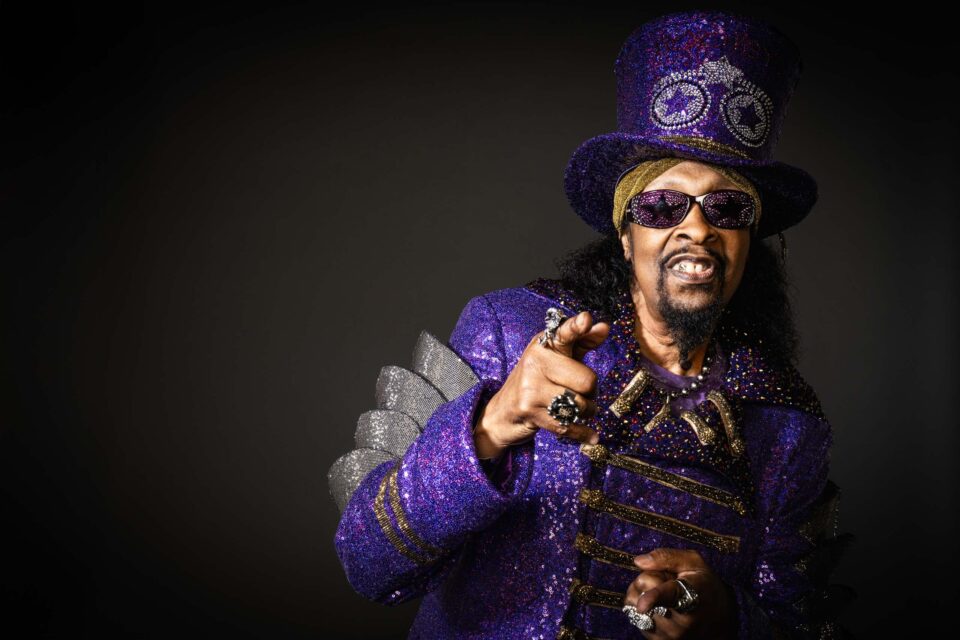
“We lost the part of being able to play with each other. And to blame it on somebody, that’s what we’ve got to stay away from, because we’re still evolving.”
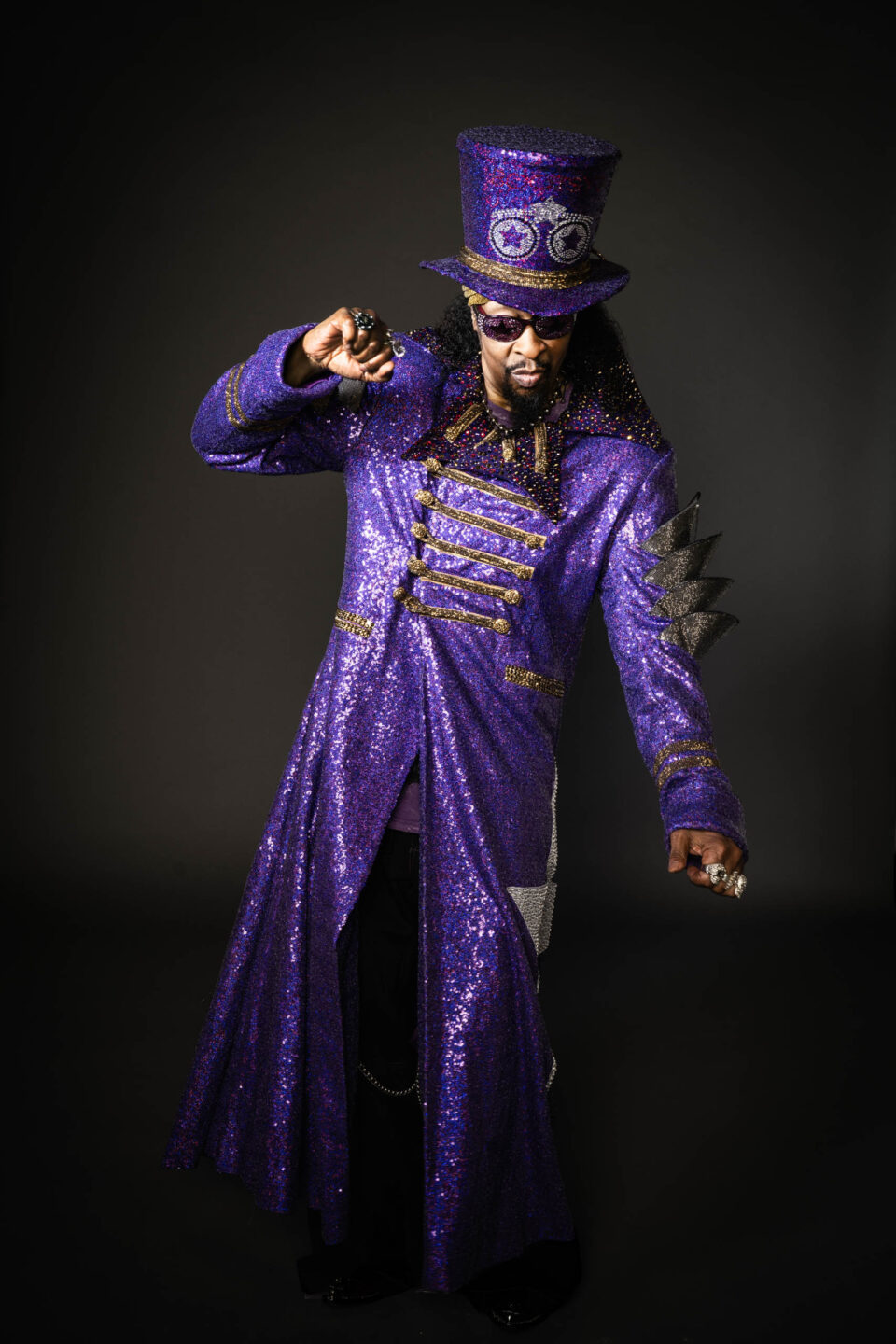
With Album of the Year #1 Funkateer, you also have “The JB’s Tribute Pastor P,” paying homage to The JB’s. Drummer Daru Jones is on the song—why did you want to put him on the album?
I don’t know if he found me or if I found him. I think it’s all in the universe. I think the universe picks what’s for us and what’s not. We knew of each other, but we didn’t know we were going to be making a record together now. When the opportunity came, he went over to [legendary Cincinnati label] King Records and Kent, my man that handles the King rebuilding, he let [Daru] in there because he wanted [to see], “Where did James Brown record ‘The Funky Drummer?’” Kent took him in there and it was like he heard the room. They set up a three-piece drum set and the sound was so incredible.
Then Daru was gigging in Cincinnati and let me hear it. It reminded me [of the classic recordings], because that’s where I recorded at before they destroyed King Records. That’s how we hooked up. Then I was trying to figure out who would bring that message home about Clyde [Stubblefield, renowned drummer best known for his work with James Brown], because that’s what I really wanted. So it wasn’t a magical thing where I came up with this. It’s something that I wanted to do and the universe set it up.
In our society, so much has become about ourselves as opposed to the unit. From what you’ve seen from a musical perspective, how and why has this happened? What have we gained or lost from that?
Well, first of all, we lost the part of being able to play with each other. It’s like us as kids, going out and playing with each other. We totally lost that. And to blame it on somebody, that’s what we’ve got to stay away from, because we’re still evolving. Don’t forget, we’ve got AI coming up—I mean really coming up. We’re just getting a little dab of it now, but it’s really getting ready to hit home where we’re going to second guess ourselves because we’re going to be humans dealing with this magical thing that’s taken over. And, sadly, ain’t too many of us gonna embrace that—especially right now, because we’re going through our own human thing. With music and what you’re talking about with the group thing, that’s fading and the individual thing is growing. Ain’t no way you’re gonna stop that.
The best thing we can do is embrace it as humans and promote the groups, because it’s all about, “You’re a note, I’m a note, he’s a note.” And everybody ain’t got the whole note. Each one of us is vehicles, and we’re notes that has to be played. They’re playing notes faster now—so fast, in fact, that it looks incredible. But it’s just the beginning. We just need to know who we are as notes and the part that we’ve got to play. We’re not going to stop the group against the computer and the box, so let’s get our minds off that. It’s more about, “What do you feel good about doing?” And that’s what we need to ask of the people, because it’s coming. Well, it’s already here. We just need to accept that and build off of that instead of knocking each other. FL
